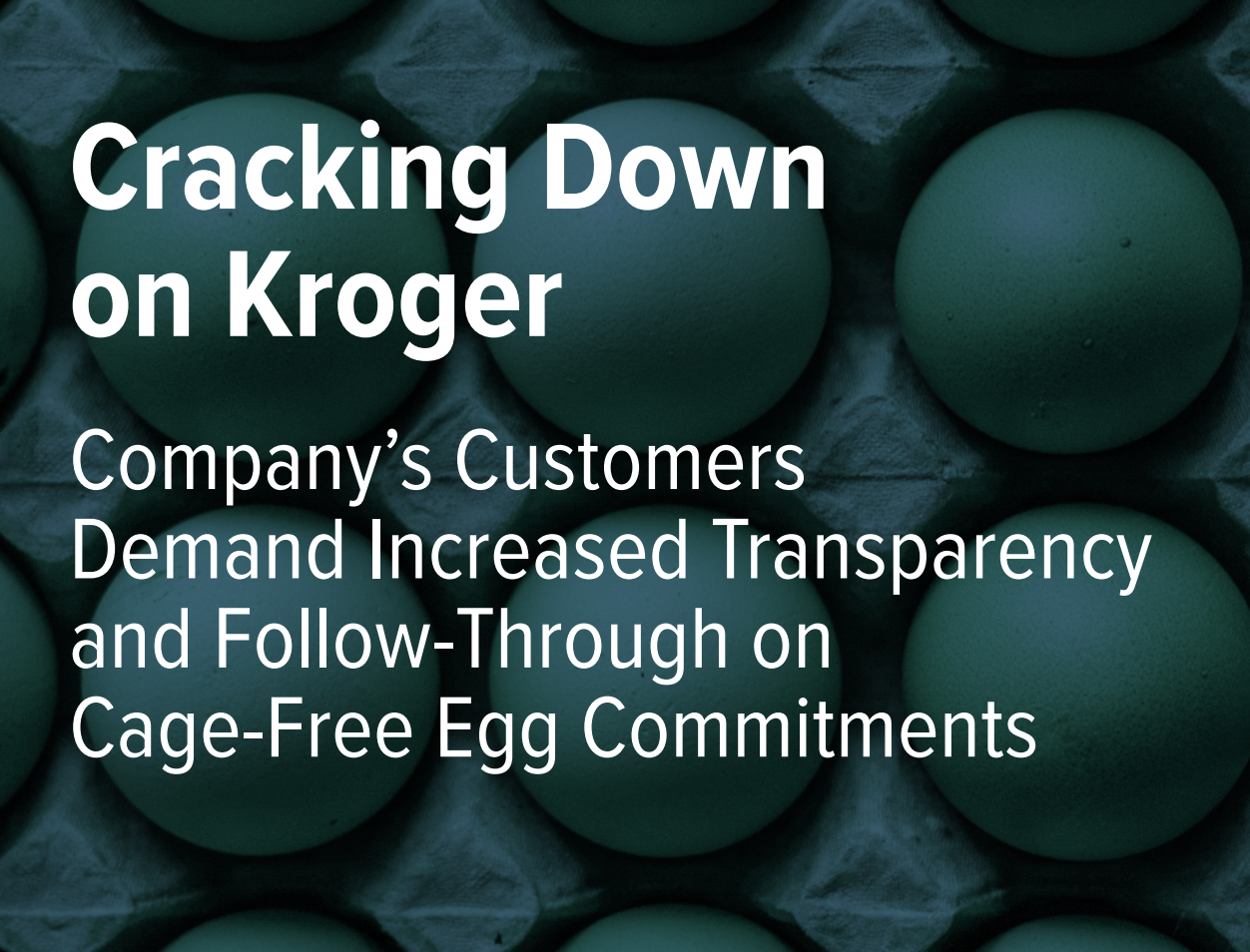Cracking Down on Kroger: Company’s Customers Demand Increased Transparency and Follow-Through on Cage-Free Egg Commitments
By Grace Adcox and Julia Jeanty
The treatment of farm animals has become an increasing concern for Americans. As the country’s meat, egg, and dairy production has evolved from small-scale family farming to the industrial concentrated animal feeding operation (CAFO) model that is prominently used in animal agriculture, we’ve ushered in a new era of food production that has ramifications for animal welfare, food safety, public health, and the environment. The majority of the over 300 million hens raised for egg production nationwide are confined in what the industry terms “battery cages.” These cages are about the size of a home microwave and confine 6-8 hens throughout their lives.
Food safety, consumer protection, and public health organizations have opposed the caging of egg-laying chickens, citing concerns related to increased risk of salmonella and other diseases. These concerns are particularly notable as rising cases of avian influenza (also known as bird flu) coupled with worsening inflation are being blamed for skyrocketing egg costs, including a 120 percent jump in the average cost of a dozen large eggs from 2021 to 2022 — reigniting the discussion about how chickens are raised in the U.S.
Animal behaviorists and welfare organizations have argued that “battery cages” are inhumane because they prevent hens from engaging in critical natural behaviors such as dust bathing, perching, scratching, walking, laying eggs in a nest, and spreading their wings. The issue has expanded beyond academia, as numerous undercover exposés of the country’s largest egg production facilities have garnered extensive media coverage, creating awareness among the general public and leading to both legislative and corporate action to address these practices across the country.
To date, nine states (Rhode Island, Oregon, Washington, Michigan, Colorado, Nevada, Utah, California, and Massachusetts) have banned the caging of egg-laying chickens with bipartisan support. Two states passed anti-hen caging laws with ballot measures: California’s 2018 Proposition 12 (passed with 63 percent of the vote) and Massachusetts’s 2016 Question 3 (passed with 78 percent of the vote). Oregon, Washington, Michigan, Colorado, Nevada, California, and Massachusetts also ban the sale of eggs from caged chickens.
Additionally, several hundred food companies have made public commitments to exclusively use cage-free eggs. Some of these companies have future dates by which to reach 100 percent cage-free eggs, including McDonald’s, Burger King, IHOP, Denny’s, Cracker Barrel, Kraft Heinz, and Target. Other companies are already exclusively — or nearly exclusively — using cage-free eggs, like Costco, Nestle USA, Taco Bell, CVS, Walgreens, Whole Foods, Arby’s, Aramark, Compass Group, Sodexo, and others.
The egg industry’s shift to cage-free production has accelerated rapidly over the last decade in the United States. According to the USDA, in 2012 the percentage of egg-laying hens that were raised in cage-free housing systems was approximately 5 percent. The current rate is roughly 36 percent, due largely to state laws and corporate purchasing policies. If corporate cage-free commitments are followed through, the percentage will reach 75 percent in 2025. In order to make this a reality, however, companies must follow through with their cage-free promises.
In 2006, Kroger committed in its proxy statement to shareholders that “our policies are designed to help to achieve humane treatment of animals,” and in the company’s 2011 sustainability report, Kroger called its commitment to animal welfare “unwavering.” Then, in a major announcement in 2016, the company committed that it would switch to only selling cage-free eggs by 2025. Following that, in Kroger’s 2020 Environmental, Social, and Governance (ESG) report (published in 2021) — which summarizes the company’s social responsibility and governance performance — it affirmed that it was “on track” to meet its pledge. However, despite the company reporting that it was on track to meet its goal, just one year later in 2022, Kroger backtracked on its pledge.
In its 2022 ESG report, the company reversed its policy to end use of eggs from caged chickens, claiming slow industry progress and consumers’ demand for affordable eggs as the main drivers for doing so. Kroger now anticipates transitioning only approximately 70 percent of its eggs to cage-free or “higher standards” by 2030, raising concerns about follow-through surrounding corporate animal welfare commitments, not to mention Kroger’s transparency with its customers as to which eggs come from caged chickens.
Given Kroger’s statements essentially placing the responsibility for its policy backtrack on its consumers, it is worth exploring how the company’s customers truly feel about this topic. Data for Progress conducted a survey from January 6-11 of 646 Kroger customers,1 finding that a majority positively view grocers who abide by cage-free promises and that a significant proportion of customers would be willing to shop elsewhere should they find out that their grocer reneged on these commitments. Perhaps most strikingly, Kroger consumers seem confused and often misled by the marketing of eggs from caged hens using labels like “Farm Fresh,” and purchase those eggs believing the hens were not confined in cages.

